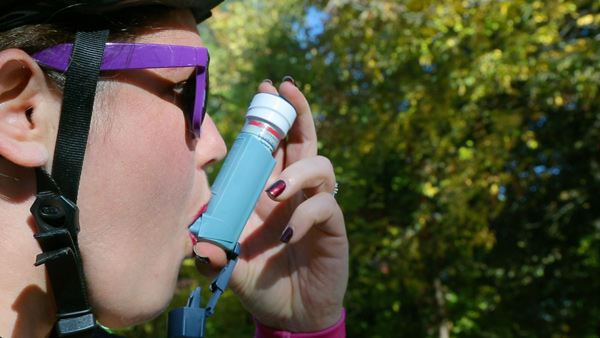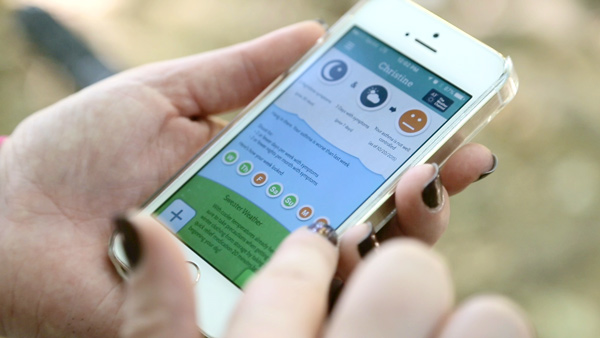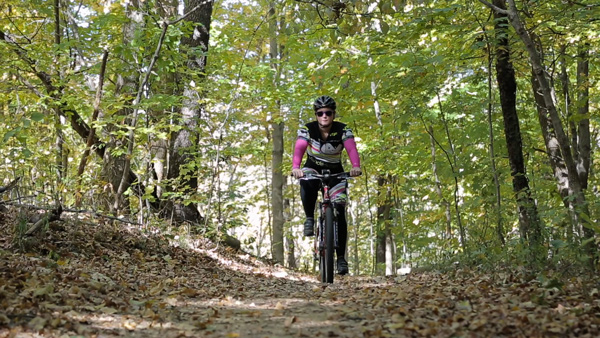
Newsletter
Sign up and stay in-the-know about The Crowd & The Cloud and the world of citizen science.


My name is Christine Vaughn. I use Propeller Health sensors to manage my asthma symptoms so I can enjoy my life without fear.
Tell us a little about yourself. Why do you love living in Louisville?
I work for an online news publication that's local to Louisville, called "Insider Louisville." I'm their marketing and events coordinator. In my spare time, I have a girl scout troop, it's a lot of fun. I live in the east end of Louisville. Kentucky, where I was born and raised. Love it here. Love the city and the parks, and everything that allows me to be super active outdoors. I actually really fell in love with mountain biking. I like being in nature, I don't have to worry about cars I just have to worry about trees (which actually hurt less when you fall!). It is a lot of fun to be able to come out and be on the trail. Either you can do it in a group of people, or you can do it by yourself and pretty much be by yourself.
Louisville has an amazing parks system that is run by the Olmsted Parks Conservancy, as well as the Louisville Metro Parks, and an organization called KyMBA, which is the Kentucky Mountain Bike Association. They all work really hard together to make our trails amazing. You don't see a lot of trash. I know me and my friends would pick up trash on the trails. Anywhere in the city, you can drive 5 to 10 minutes, or ride your bike, and be in a park that you can pretty much ride through. We do beer rides on our mountain bikes, which is always an incentive. We all say that we ride our bikes because we enjoy the beer after.

Tell us a little about your history with asthma?
I have had allergies my entire life. They started testing me early, so I started to get treatment and help early. I had a really great run for 20 years of my life and then all of a sudden my asthma came back. People ask me all the time, "Hey, why don't you move?" Well, I have. I have traveled all over. It really didn't make a difference. It's more about control and medication. My allergies cause sinus issues and things like that. It probably has a lot to do with the Ohio Valley, but I don't think it's the leading factor, after some research and study. I asked my doctor one time, "Hey, should I move?" He said, "Antarctica might work." We are just going to work on managing it, but I don't let it stop me from what I want to do. I have always played sports. I had my allergist look at me after a breathing test and say, "If you stop being active you'll be even worse, so stay active." I might not be in the best condition all the time, but at least I’m making my lungs stronger.
How did you get involved with Propeller Health?
There was an event at my company, presented by Ted Smith from Air Louisville. They were talking about Propeller and a study that they were working on, while I was literally getting my inhaler out of my bag to use it. I was like, "I should probably talk to them."
How has the sensor become part of your life?
I have come to rely on using the data that comes from the sensor. I travel with one at all times. When I first got it, it was really helpful because I was really sick at that time. I was going through stages of trying different medications to manage my symptoms. And I was not doing very well. I would use the sensor and get notifications that tell me I was having a bad day, and "I hope you feel better, but your asthma is not well controlled.” Actually, after awhile, one of the nurse practitioners, Melissa Williams, from Propeller called me, and just introduced herself, "We see you've been using it a lot. Can you tell me your symptoms? You think there's anything that we can do? Do we need to talk to your doctor?"
It's also helped to train me when I use the sensor, to look at the app and put in data and my symptoms. Even when I went to Chattanooga, I had to use my inhaler with the sensor. There were mountains and valleys there with pure clean air! Sometimes triggers aren’t what you think, I’m even sensitive to going from hot to cold. You can do that pretty much anywhere in the world, go from hot to cold. It's good to follow that. Did I go two weeks without any symptoms? That's awesome. That's really a long time for me. Have I gone a month? Then I can say, "OK. Something is working. What medications did I start or stop?"
I'm not as bad as I should be at this time of year compared to a lot of other people and what their symptoms are. I think the sensor does help. Am I using it every hour consistently for days? If so, I go to the doctor. Because sometimes you don't notice. If I'm in the car and I start having shortness of breath, it's right there to just use. It's helpful because I can look up how much I’ve used my inhaler and say, "OK. I used this at 2:05. That means I really should try and hold off using it until four hours down the road." It tracks all of it. It's nice to have all the data in one place.

What does the data recorded by your inhaler sensor mean to you?
I like information. It's interesting to be able to plot stuff out. For instance, I can tell that travel doesn't affect my asthma, because I can go back and look at the data. We also have data points. A lot of my symptoms are happening at work. What in my office is triggering it? I can add data points that say, "Every day at two o'clock, I have to use my inhaler. Was it because I came back from lunch and walked up the stairs to our office, or is it because the UPS truck is outside, with its diesel fuel, every day at two o'clock delivering a package?" It's a lot like a map. Air Louisville have have come up with studies where they've shown that some areas of the city are actually a lot worse for asthma.
It's really nice to be able to see the data, instead of just trusting your gut. You can pull that information out and graph it, and you can play with it. You can have it make sense to others. That's also a major issue I've had, explaining to people why yesterday I could walk up a flight of stairs and was perfectly healthy, and then today I fear walking up the stairs, because I know as soon as I get to the top I'm going to be short of breath. I can pull out the data and be like, "Well, today's an air quality alert day." You can explain to people why. "This is why. This is why I change on a daily basis." I like to show it off to people, "Look, I'm not crazy!"
As a patient, how do you see the value of citizens across Louisville using this sensor for the future of asthma in Louisville?
I think it's good that we're all connected. We all have the same sensor that goes to one central location. The data all is being pulled from different people, so you can see where the worst locations are for asthma. "We know there's a high concentration of pollen, because you live right next to a park," or "There's a high concentration of mold, because you have a swimming pool.” That's helpful. If 20 people all live in the same area, and they're all having the same symptoms at the same time, is there a release of some kind at that time? Is that because of a treatment plant or something that's going on? They could all live in close proximity to a factory, for example, that was letting off gases that day.
There’s a connection with the doctors. You can put your information in and give them permission to look at your data. When I go see Dr. Sublett at Family Allergy & Asthma, I can say, "Look, here are my data points," and he's like, "Yes, I have the report." We can look at them and see, "OK, maybe you should avoid this area." You can play with that a little bit. Or when Propeller gets the information, they can look at the data. If 50 people all used their inhaler within 20 minutes in the same location, say, Thunder Over Louisville, "OK, maybe fireworks aren't the best thing for asthma, we're going to recommend that you don't go to the river and watch the fireworks." They can tell that's an actual reaction versus relying on people's memory.

Technology's a wonderful thing, and it's moving us in the right direction, especially when it's used in this sense, to help find a cure, a better way for people with asthma to live. I'm probably one of the outliers that just accepts it and does what I can until I can't. I figure out how to get better, so I can go back to it. Some people use it, because they’re afraid. It's not fun to stop breathing. It's scary, and it freaks you out, especially if you thought you had your inhaler and you don't. Either you have to be willing to accept that, or you live your life inside sitting next to your inhaler.
What's it like for you when you have asthma attacks?
One time, I thought I was going to pass out, because I just couldn't get any breath in or out. You feel chest tightness. Your heart hurts, even though it's not a heart attack. Basically, everything in your body is trying to get you to breathe. Your lungs are just not working. That first puff of the inhaler is the best gift ever. It's like you don't ever want to leave it. If you're full blown and can't do anything about it, you start to have the no peripheral vision, because you can't breathe. You're not getting any oxygen. It's super scary. Don't ask my mom about the time I called her at 2:00 AM from college going, "I can't breathe." She's like, "What the hell do you want me to do about it? I'm three and a half hours away. Go to the emergency room!" She's like, "You scared me more than I let you know." You learn to deal. You really do. I have been very fortunate.
